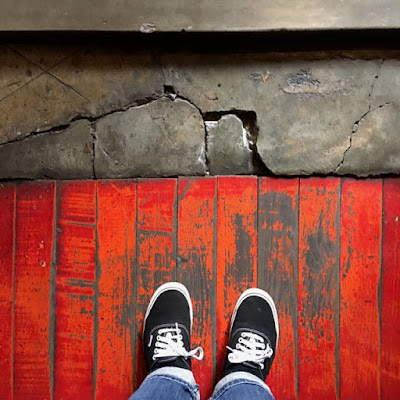Wondering where you're headed next? It's time for the 6th round of my own small mentor program. For five years, I've virtually met once a month with one or two colleagues, for a year, to talk museums, careers, how larger issues affect our field and how to strategically navigate a workplace. It's certainly been a year of change for me, shifting from full-time consulting to full-time work with the International Coalition of Sites of Conscience (and readers may have noticed, a decline in the frequency of blog posts, something I plan to make temporary). My new job has taken me everywhere from Leon Trotsky's house in Mexico City (above) and overlooking the World Heritage Site, the Island of Goree' in Senegal (below) and has really pushed my own thinking about the role museums can play.
This year, Tania Said and I met once a month--and even had a chance to meet in person at the AAM meeting. You might think mentorship is only for emerging professionals, but Tania, like several of my other mentees over the years, is a mid-career museum educator. I asked her what she thought of the experience:
I continue to be in touch with mentees from prior years and I'm so pleased to regularly hear from them and catch up on their work. I'm even more pleased to report that many of them, including Tania, have become mentors themselves. And as Tania said, about both being a mentor and a mentee, "There are more reasons to do it than you can possible imagine."A fresh perspective is what I needed for a mid-career boost and Linda Norris’ mentoring helped me gain just that! She’s an excellent listener and has valuable years of experience to ask the right questions for reflecting on personal and professional growth.
What's the Mentorship Look Like?
We'll schedule monthly Skype conversations at times convenient for us both, and you can apply no matter where you live or work or what stage of your career you're in. I'll expect you to be both a good listener and a good questioner--and be willing to look at your self deeply.
From you, I'll expect one or two blog posts over the year on deadlines we mutually set and of course, active participation and questioning when we talk. In addition to the monthly conversations, I'll also provide feedback, introductions as I can, and loads and loads of opinions!
If you want to know more about my work and my approach to the field. please read blog posts, check out my LinkedIn profile, follow me on Twitter or Instagram, and of course, check out Creativity in Museum Practice, co-written with the amazing Rainey Tisdale.
What Makes a Good Mentee?
Okay, I'm In! How do I Apply?
If you're interested, by January 8, 2018, send me an email with the subject line "mentorship" that includes two attachments: your resume and answers to the following questions:
- What are you passionate about?
- What questions would you like to discuss with me during the year?
- What was an early creative act? (I mean, not in work, but early, as in childhood)
- What change would you like to make in the museum field?
- When did you fail and what did you learn?
- What's the most interesting exhibit or program you saw in the last year?
Because this is my own individual project, I get to make my own decisions, sometimes with the counsel of a few trusted colleagues. Previous years' mentees have been in graduate school, emerging professionals or mid-career types. In other words, at any point in your career. I'm probably not very interested in you if your key questions are about becoming a consultant. Non-US applicants, you're particularly encouraged to apply.
I want to be challenged and intrigued, I don't care about your Meyers-Briggs type or your grades in graduate school. I appreciate people who don't take themselves too seriously. I want to get off that Skype call every month ready to think more about your work and my work and the ways we can make change. Museums have a larger role to play in this complex world--but only if we dig in and get at it.



